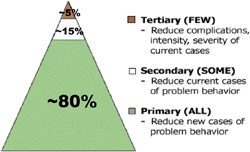Schoolwide Positive Behavioral Supports - A system for student success
South Central

What is SW-PBS?
Student discipline is a leading factor in disrupting the teaching and learning processes in the classroom, often resulting in the exclusion of students during the class period or throughout the school day. School-wide Positive Behavior Supports (PBS) provides a model for a school wide approach for implementing a system of discipline or positive behavioral interventions and supports.
| Students learn appropriate behavior in the same way they learn to read - through instruction, practice, feedback, and encouragement. |

Why use SW-PBS?
School-wide discipline has often focused mainly on reacting to specific student misbehavior by implementing punishment-based strategies. Research has shown that the implementation of punishment, especially when it is used inconsistently and in the absence of other positive strategies, is ineffective. Introducing, modeling, and reinforcing positive social behavior is an important aspect of a student's educational experience. Teaching behavioral expectations and rewarding students for following them is a much more positive approach than waiting for misbehavior to occur before responding.
Schools, pre-kindergarten through high school, consistently implementing SW-PBS:
- Improve school climate
- Improve student achievement
- Reduce suspension and referral rates, and
- Increase student attendance
How does the SW-PBS process work?
When setting up a school-wide system of discipline or positive behavioral interventions and supports, the following steps should be followed:
- Establish a school-wide leadership or behavior support team to guide and direct the process. This team should be made up of an administrator, grade level representatives, support staff, and parents.
- Secure administrator agreement of active support and participation.
- Secure a commitment and agreement from at least 80% of the staff for active support and participation.
- Conduct a self assessment of the current school-wide discipline system.
- Create an implementation action plan that is based data based decision making.
- Establish a way to collect office referral and other data on a regular basis to evaluate the effectiveness of school-wide PBS efforts.
Leadership Teams for SW-PBS
A leadership team is needed to lead the assessment and action planning process. The objective of the team is to increase capacity in four primary areas:
- Training Capacity refers to the system's ability to self-assess for specific programmatic and staff development needs and objectives, develop a training action plan, invest in increasing local training capacity, and implement effective and efficient training activities.
- Coaching Capacity refers to the system's ability to organize personnel and resources for facilitating, assisting, maintaining, and adapting local school training implementation efforts. Resources are committed for both initial training and on-going implementation support.
- Evaluation Capacity refers to the system's ability to establish measurable outcomes, methods for evaluating progress toward these measurable outcomes, and modified or adapted action plans based on these evaluations.
- Coordination Capacity refers to the system's ability to establish an operational organization and "rhythm" that enables effective and efficient utilization of materials, time, personnel, etc. in the implementation of an action plan.

Follow South Central Regional Professional Development Center